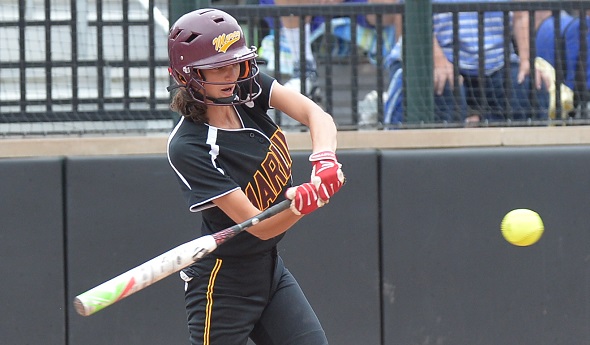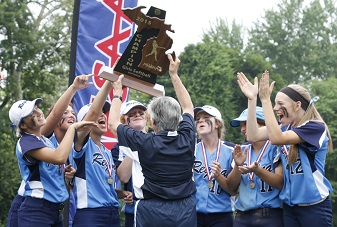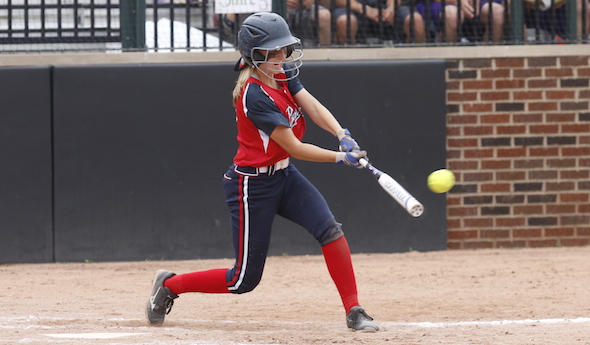
Detroit Powers Succeed Amid Lower Numbers
By
Tom Markowski
Special for Second Half
April 20, 2016
Participation in spring sports, following a similar decline in student-aged population in Michigan, has been on a decline statewide over the last decade.
 But while some like baseball have experienced a slight bounce-back over the last few seasons, softball in particular has seen its numbers continue to fall.
But while some like baseball have experienced a slight bounce-back over the last few seasons, softball in particular has seen its numbers continue to fall.
Coaches and administrators in the Detroit area point to a number of factors intertwined that produced a snowball-like effect – and now it seems to have come to a head.
Three softball programs in the Catholic League Central, a division that competes at a high level statewide, don’t have sufficient numbers to field a junior varsity this spring. Many programs don’t sponsor freshmen teams for the same reason.
But for schools like Birmingham Marian, Farmington Hills Mercy and Livonia Ladywood not to have a junior varsity softball team is quite shocking to some – especially considering that Mercy enters this season ranked No. 3 in Division 1 and Ladywood is No. 2 in Division 2.
Specialization fallout
Marian athletic director Dave Feldman isn’t among those stunned. He saw this coming. Feldman points to the 2007-08 school year when the Michigan High School Athletic Association was forced, by court decision, to switch the volleyball season from the winter to the fall and the girls basketball season from the fall to the winter.
Feldman has a daughter, a freshman at Marian, who participated on the junior varsity volleyball team this fall. When that season was over she joined a club volleyball team. Feldman said the club volleyball season begins in December and continues on into June.
“It’s not AAU,” Feldman said. “But you need to be an AAU member (to play). They play all of the time. Heck, they played on Easter Sunday. And every club is filled.”
The pressure on athletes to play year-round is arguably greater now than it ever has been, and can come from coaches, peers and family – based on a frequent misconception that if athletes want to earn a scholarship, they better keep up with the Joneses or be left behind.
Feldman said he’ll back his daughter with whatever decision she makes. If she wants to play volleyball nine or 10 months a year, he’ll support that. But Feldman said, financially, it’s getting out of hand. He estimated between the cost of airfare, hotels and meals that he’ll spend $6,500 in support of his daughter playing club volleyball.
And, according to Feldman, the increase in attention on volleyball is affecting participation in other sports.
“(Girls) basketball is fighting for its life,” he said. “Our field hockey program (a fall sport) is fine. Our lacrosse teams are fine.
“We have 15 playing volleyball at all three levels. We had 16 (total) try out for softball and we made two cuts. We haven’t had a JV the last two years. The last time we had a freshman (softball) team was in 2004 or 2005. The last few years the numbers have dropped off. It’s the specialization.”
Simply signs of change?
Warren Regina is another member of the Catholic League Central. Regina athletic director Diane Laffey also is the head coach for softball and basketball, and she said she thinks lacrosse has drawn some athletes away from softball – which makes sense, although the total number of girls playing high school lacrosse in Michigan has increased only about 1,000 over the last decade, while softball participation is down 4,000 athletes over the same time.
One should not use Regina as an example of decline – Laffey’s team won the Division 1 championship last spring and fields a softball team at all three levels. At the same time, Regina also has seen a rise in participation in lacrosse. There are 18 playing for both the varsity and junior varsity this spring, the highest participation in school history.
Mercy varsity softball coach Alec Lesko said, simply, that times have changed. Mercy reached the Division 1 Semifinals last season, just as Ladywood did in Division 2 the year before – yet despite this success, Mercy’s number of softball players also has declined.
 “(The students) have many more options,” Lesko said. “In addition to their school work there’s band, theatre, honors society clubs. In the past kids would play three sports and be in the band. All of my daughters were multi-sport athletes. By their sophomore year they had to make a decision (on which sport they would concentrate).
“(The students) have many more options,” Lesko said. “In addition to their school work there’s band, theatre, honors society clubs. In the past kids would play three sports and be in the band. All of my daughters were multi-sport athletes. By their sophomore year they had to make a decision (on which sport they would concentrate).
“It’s also economics. They want to earn a scholarship. You hear horror stories about (the cost of) student loans. Even the big schools have trouble getting the (students to play softball).
“As far as college, and I can only speak about softball, the Big Ten coaches want the player they recruit to play other sports,” Lesko added. “I hope to have a JV program next year. A player that misses 30 JV games, we will feel that crunch later. There are those who think JV softball is a waste of time, that you should just compete in travel (during the summer). We will get some of those kids. Those who compete in travel then come to us as sophomores.”
Reasons for optimism
Don Peters is the softball coach at Clarkston, and between coaching travel and at the high school level he’s put in 35 years. He coached travel before taking over the Clarkston program. Peters said the two complement each another, or at least they should.
“I know some disagree,” he said. “The girls have a lot of choices in the spring. Look at all of the sports they can play. I don’t think lacrosse has cut into the numbers. Not yet, but it’s probably going to. We haven’t been affected. We have 45 (covering three teams) in our program. We really push softball in our community because it’s been established.”
Peters said coaches in softball and baseball need to make the game enjoyable, and one way is to reward those who chose to participate by playing them on a regular basis. A student who is No. 14 or 15 on a squad often will play once a week and, with all of the options available, isn’t willing to put in the practice time for limited game action.
Mercy senior first baseman Abby Krzywiecki played a variety of sports before her freshman year. It was then she decided that softball would be her main sport and she chose to pour all of her energy into it.
She said it’s not all gloom and doom for her sport.
“We had a small freshmen class (last year),” she said. “When I came in we had a large class. It was one of the biggest. It’s not that we’re not getting softball players. In the travel world, it’s becoming more intense. We have more younger people playing. The sport is getting more intense. The talent level is getting higher.”
 Tom Markowski is a columnist and directs website coverage for the State Champs! Sports Network. He previously covered primarily high school sports for the The Detroit News from 1984-2014, focusing on the Detroit area and contributing to statewide coverage of football and basketball. Contact him at [email protected] with story ideas for Oakland, Macomb and Wayne counties.
Tom Markowski is a columnist and directs website coverage for the State Champs! Sports Network. He previously covered primarily high school sports for the The Detroit News from 1984-2014, focusing on the Detroit area and contributing to statewide coverage of football and basketball. Contact him at [email protected] with story ideas for Oakland, Macomb and Wayne counties.
PHOTOS: (Top) A Farmington Hills Mercy hitters prepares to connect during last season's Division 1 Semifinal against Caledonia. (Middle) Warren Regina coach Diane Laffey hoists her team's championship trophy after the Saddlelites downed Caledonia in the Final last spring.

Next Group Takes Place Among USA Greats
June 13, 2015
By Bill Khan
Special for Second Half
EAST LANSING — The softball coaches at Unionville-Sebewaing don't need to waste much time talking about tradition to their incoming players.
Nearly every athlete who comes into the program has already witnessed that tradition first-hand.
Many of the current players watched from the stands at Bailey Park in Battle Creek while the Patriots competed in MHSAA semifinal and championship games. As young girls, they idolized the teenagers who wore the red, white and blue of Unionville-Sebewaing.
Just as some young girls currently look up to junior Nicole Bauer, who pitched a one-hit shutout in a 5-0 victory over Kalamazoo Christian in the MHSAA Division 4 championship game Saturday at Michigan State University.
It was the fourth MHSAA title for the Patriots, who have played in seven Finals in the past 10 years. They won it all in 2006, 2007 and 2009 before losing three close Finals in 2011, 2013 and 2014. They have played in at least the quarterfinal round for 12 straight years, making the Semifinals 11 times.
"I was just so in awe of them and how great they were," Bauer recalls of her early impressions of Unionville-Sebewaing softball. "I just knew I wanted to be on that field some day."
Recalling their own childhoods, the Patriots (38-3) were mindful of the likelihood that future Unionville-Sebewaing stars were watching from the stands at Secchia Stadium on Saturday.
"Before the game, our speech was 'Play for that little girl that we were that was sitting in the stands just like the little girls are here today,'" Bauer said.
And, thus, tradition is handed down from one class to another.
"One of the things I'm proud of is all of these girls are homegrown USA kids," Patriots coach Steve Bohn said. "It's like the Yankees. Hey, we win championships. When you go there, you know that's the expectation. That's the expectation they have, because that's all they've seen. Everybody's worried about being the one team that doesn't get here. Nobody wants to be that team."
For all of the Patriots' success, none of the current players had won an MHSAA championship — until Saturday.
"I came down to Battle Creek to watch them play, watch them win and sometimes fall short," senior third baseman Madison Zimmer said. "I was really determined to get another state championship."
 It was a title game that oozed with tradition, as the Patriots' opponent was a Kalamazoo Christian squad trying to match the record for MHSAA softball championships. The Comets have seven titles, one fewer than Waterford Our Lady.
It was a title game that oozed with tradition, as the Patriots' opponent was a Kalamazoo Christian squad trying to match the record for MHSAA softball championships. The Comets have seven titles, one fewer than Waterford Our Lady.
Kalamazoo Christian (29-15) reached its third straight MHSAA Final, despite a roster comprised of eight sophomores, two freshmen, two juniors and only two seniors.
"These girls are JV kids playing varsity," Comets coach Terry Reynolds said. "Coming here and playing in the semifinals and state championship, it shows the girls what they can do. We got here. Now we've got to do something about it. We're already talking about next year. This group wants to be back next year. They'll be stronger and work harder."
The Comets couldn't solve Bauer, who allowed only one base runner. Aliyah Lemmer led off the fifth inning with a single after the first 12 batters were retired in order. After that, Bauer got the final nine batters in a row, striking out Lemmer to clinch the championship.
"I felt very confident," Bauer said. "I knew if I kept it in the field that my players would make outs for me."
The Patriots scored their five runs with a three-run fourth inning and a two-run fifth.
Zimmer lined the first pitch she saw for a two-run double to left-center field to open the scoring in the fourth. After going to third on a wild pitch, Zimmer scored on a sacrifice fly to center by Katie Engelhardt.
"It was huge, because we had runners on and we needed to get them in," Zimmer said of her double. "Nicky did a great job. She held them until we could hit; that really helped."
The Patriots built their lead to 5-0 when Bauer lined a two-run single to left with two outs in the fifth.
"We didn't have a lot of opportunities," Bohn said. "We didn't swing the bats real well. That hit Maddie Zimmer got, that first one you get across the plate, especially the way Nicky was throwing, that's huge. That's the one hit we had to get. That loosens everybody up, and the other ones start to happen."
PHOTOS: (Top) A Unionville-Sebewaing batter connects during Saturday’s championship game. (Middle) USA’s Sara Reinhardt beats a throw to second base.

